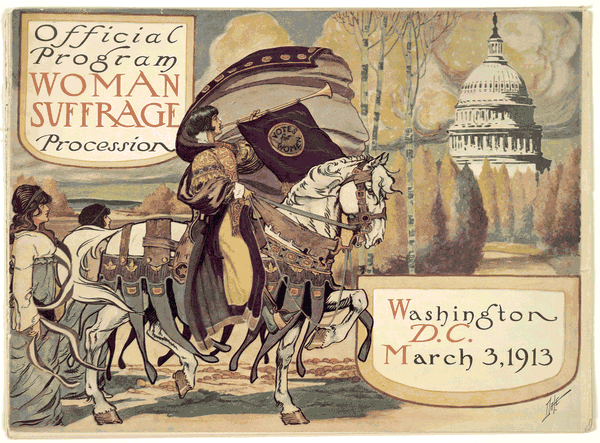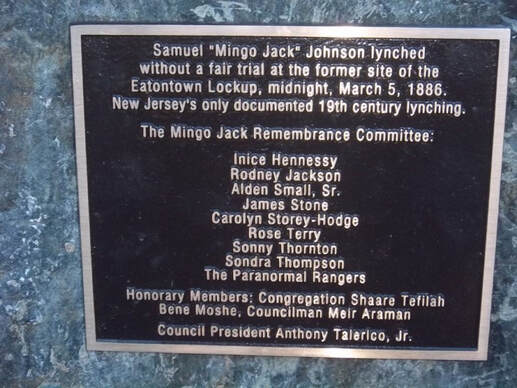* Home
|
-- New Jersey History Timeline - March* January * February * March * April * May * June * July * August * September * October * November * December On March 1 of 1932 Charles Lindbergh, Jr., the 20-month-old son of Charles and Anne Morrow Lindbergh, is kidnapped from the second floor bedroom of the family home in Hopewell. On May 12, the boy's body is discovered in nearby woods, and on April 3, 1936, Bruno Richard Hauptmann is executed at the Trenton State Prison for the crime. On March 2 of 1776 The Provincial Congress of New Jersey orders the sale of the British ship Blue Mountain Valley and its cargo, which was seized in the harbor at Elizabeth Town by armed Continental militia. On March 3 of 1913
Alice Paul of Moorestown is one of the leaders of a march in Washington of 8,000 protesters demanding voting rights for women On March 4 of 2020
James Cai, a 32-year-old New York physician assistant with an apartment in Fort Lee, is the first person in New Jersey to be diagnosed with coronavirus and is .hospitalized at Hackensack University Medical Center, where he remains for three weeks before being discharged. On March 4 of 1913 Woodrow Wilson is inaugurated as president of the US after previously serving as governor of New Jersey and president of Princeton University On March 5 of 1960
After competing his two years of service in the Army stationed in Germany, Elvis Presley is discharged at Fort Dix On March 5 of 1886
Samuel "Mingo Jack" Johnson, an African American born a slave, is lynched by a mob in what is now Eatontown. The mob attacked the jail where Johnson was being held on suspicion of his role in a rape of a local woman, who could not identify him but said that her rapist asked if she knew a "Mingo Jack," a nickname Johnson had received as a jockey after he had won a race on a horse named "Chief Mingo." Born in Colts Neck in 1820, Johnson was abandoned by his parents and raised by a white family, the Lairds. It was later proven that Johnson had no involvement in the rape. On March 6 of 1962
One of the ten worst storms of the 20th century, a Nor'easter known as the Great March Storm of 1962, strikes the Mid-Atlantic states. In New Jersey, some 45,000 homes are destroyed or heavily damaged, with the storm also tearing away part of the Steel Pier in Atlantic City and breaching Long Beach Island in several places. On March 7 of 1971
The body of 40-year-old Jean Wilson Day, an assistant professor of chemistry at Rutgers University, is discovered by her 10-year-old daughter in her mother’s bed at their home in Piscataway. Police believe she had been bludgeoned to death by blows to her head sometime in the previous night. No one is ever charged with the crime. Rutgers establishes a scholarship in her memory. On March 8 of 2017
Marches and demonstrations at various sites in New Jersey, including Trenton and Princeton, are part of events around the world celebrating International Women's Day, during which some advocates encourage women to skip work and join protests for greater progress toward women's economic and social equality. On March 9 of 2020
Governor Phil Murphy issues Executive Order 103 declaring the existence of a Public Health Emergency for COVID-19 after five additional residents are diagnosed with COVID-19, bringing the statewide total to 11. The declaration allows state government to deploy resources more quickly by waiving a number of regulatory requirements such as the bidding process for medical supplies. 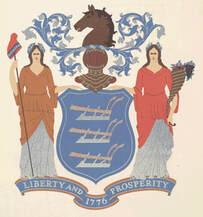
On March 10 of 1777
The Provincial Assembly of New Jersey, at its session at the Indian King Tavern in Haddonfield, approves the adoption of 'The Great Seal of New Jersey.' It was designed by Pierre du Simitiere of Philadelphia, a native of Switzerland who also served as a consultant to the committees that designed the Great Seal of the United States and suggested the adoption of the US motto 'E pluribus unum' ('Out of many, one'). He also designed the Seals of Delaware and Georgia. On March 10 of 2020
State officials announce the first death in New Jersey attributed to COVID-19 had occurred in Bergen County to 69-year-old John Brennan, a resident of Little Ferry who died of a heart attack at Hackensack University Medical Center. Some days later, it was disclosed that Brennan had contacts with a New Jersey family in which COVID-19 would kill four family members. On March 11 of 1888
The 'Blizzard of '88' begins and continues through March 14. Over two feet of snow is recorded in parts of the state, with drifts of up to six feet in Atlantic City. On March 11 of 1982 Democratic US Senator from New Jersey Harrison A. Williams resigns his Senate seat shortly before a vote by the Senate to expel him. Williams previously had been convicted of bribery and conspiracy in the so-called "Abscam" scandal for taking bribes in a sting operation conducted by the FBI. Sentenced to three years, Williams served two years in federal prison and was fined $50,000. On March 12 of 1755
The first use of a steam engine in America takes place at the Schuyler copper mine to pump water out of the mine in what is now North Arlington in Bergen County. The engine was built by Josiah Hornblower, who had recently arrived from England and later served during the Revolution as speaker of the New Jersey Assembly and as a delegate to the Continental Congress. On March 13 of 2010
Sandra McNeil of Morristown becomes the first in New Jersey to win the Powerball lottery jackpot when she wins $211.7 million, with the New Jersey lottery becoming the first state lottery to sell winning tickets for both the Powerball and Mega Millions drawings 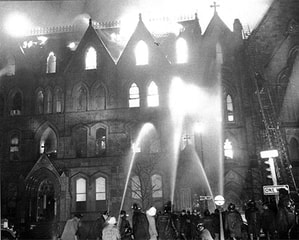
On March 14 of 1956
St. Mary's Cathedral, the Cathedral church of the Diocese of Trenton, is destroyed by one of the worst fires in Trenton's history which results in the deaths of the monsignor who served as rector and two rectory housekeepers On March 15 of 2018
Toys "R" Us, the global toy retailer founded in 1948 by Charles Lazarus and headquartered in Wayne, announces that it will cease operations and close all 800 of its stores. On March 16 of 2012
A jury in New Brunswick convicts former Rutgers student Dharun Ravi on counts including invasion of privacy and destruction of evidence for using a webcam to record and broadcast sexual activity of his gay roommate, Tyler Clementi, which led to Clementi's suicide. Ravi served 20 days in jail. On March 17 of 1780
In a letter on this date, George Washington writes to the Marquis de Lafayette on the brutal winter which the Continental troops had experienced during their encampment at Morristown: “… the oldest people now living in the country do not remember so hard a winter as the one we are now emerging from. In a word the severity of the frost exceeded anything of the kind that had ever been experienced in this climate before.” On March 19 of 2005 John DeLorean, founder of the DeLorean Motor Company which made the uniquely styled sportscar named after him which was featured in the movie 'Back to the Future', dies at the age of 80 at Overlook Hospital in Summit from a stroke. In 1982, he was acquitted of charges that he was involved in a scheme to sell cocaine and in 1985 also acquitted of charges of tax evasion and defrauding investors. On March 20 of 1747
Puritan missionary David Brainerd ends his work among the Native Americans in New Jersey and Pennsylvania due to failing health. On March 21 of 1778 In what becomes known as the Massacre at Hancock's Bridge, Loyalists under the command of Colonel Charles Mawhood kill some 20 of the colonial militia in a surprise night bayonet attack near the town of Salem. 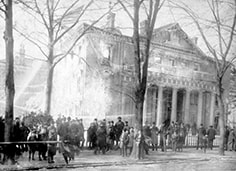
On March 21 of 1885
A fire destroys a wing of the State House in Trenton. Its reconstruction includes a new rotunda and dome which remain as part of the current structure. 
On March 22 of 1758
Jonathan Edwards, the third president of The College of New Jersey (renamed Princeton University in 1896) who had succeeded his son-in-law Aaron Burr Sr. as head of the College after Burr's death, dies in Princeton some five weeks after being inoculated against smallpox. A prominent theologian and minister, Edwards had been a leading advocate for widespread inoculations against smallpox. 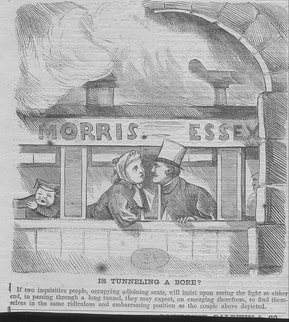
On March 23 of 1835
The Morris and Essex Rail Road Company is organized to build a line from Newark to Morristown 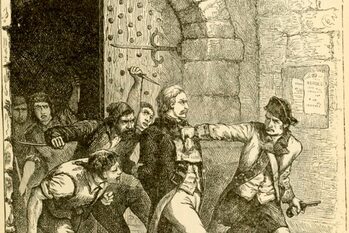
On March 24 of 1782
Loyalist forces assault a blockhouse in Toms River defended by patriot soldiers commanded by Captain Joshua Huddy. Huddy is taken prisoner, and later summarily executed by Loyalists. 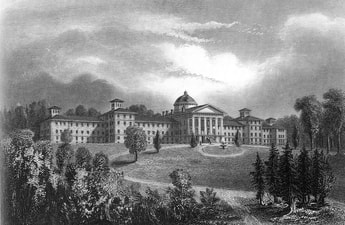
On March 25 of 1845
The New Jersey legislature approves the establishment of a state mental hospital following active lobbying by reformer Dorothea Dix 
On March 26 of 1920 F. Scott Fitzgerald's debut novel, This Side of Paradise, is published, largely written while he was a student at Princeton University, and highlighting campus life and its exclusionary student eating clubs. 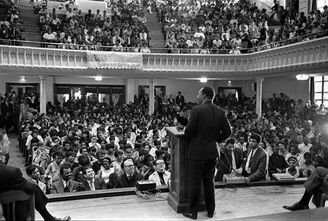
On March 27 of 1968
Dr. Matin Luther King, Jr., visits Newark, speaking at the Abyssinian Baptist Church. Eight days later, he is assassinated in Memphis. On March 28 of 2017 Bridget Anne Kelly, Governor Christie's former deputy chief-of-staff and Bill Baroni, former deputy executive director of the Port Authority, are sentenced to 18 months and 24 months, respectively, as a result of their convictions in the Bridgegate trial relating to the closing of access lanes to the George Washington Bridge, ostensibly to punish the mayor of Fort Lee for his refusal to support the re-election of Governor Christie. In May 2020, however, the US Supreme Court unanimously vacates their convictions in Kelly v. United States, holding that since there was no finding that they had sought to obtain money or property, Baroni and Kelly could not have violated the federal-program fraud or wire fraud laws. On March 29 of 2017
President Trump and Governor Christie hold a "listening session" at the White House, marking the first public event of the drug addiction commission which Trump had appointed Christie to chair on the previous day. On March 30 of 1896 Emanuel Ninger, a German immigrant who owned a small farm in Flagtown, is arrested as a counterfeiter. Known to the Secret Service as "Jim the Penman," Ninger copied bills by painting, with his work praised for its accuracy. He served six years in a federal prison in Pennsylvania.
On March 31 of 1976 New Jersey Supreme Court issues opinion in In Re Quinlan, 70 N.J. 10, 355 A.2d 647, first major judicial decision to hold that life-sustaining medical treatments may be discontinued in appropriate circumstances, even if the patient is unable or incompetent to make the decision. The Court's decision subsequently has been followed by nearly every court to consider the issue and has served as basis for many laws enacted throughout the states. In addition to establishing a patient's right to refuse life-sustaining medical treatments, the Quinlan decision also clarified that a decision to remove or withhold life support systems from an incompetent patient would not constitute homicide or medical malpractice. The case centered around 22-year-old Karen Ann Quinlan who stopped breathing and lapsed into a coma on April 15, 1975. Quinlan's treating physicians determined that in addition to being comatose, Quinlan was in a "chronic persistent vegetative state" and could not survive without the assistance of a respirator. Despite being taken off the respirator following the Court's decision, Quinlan survived for another nine years in her comatose state before dying.
|
